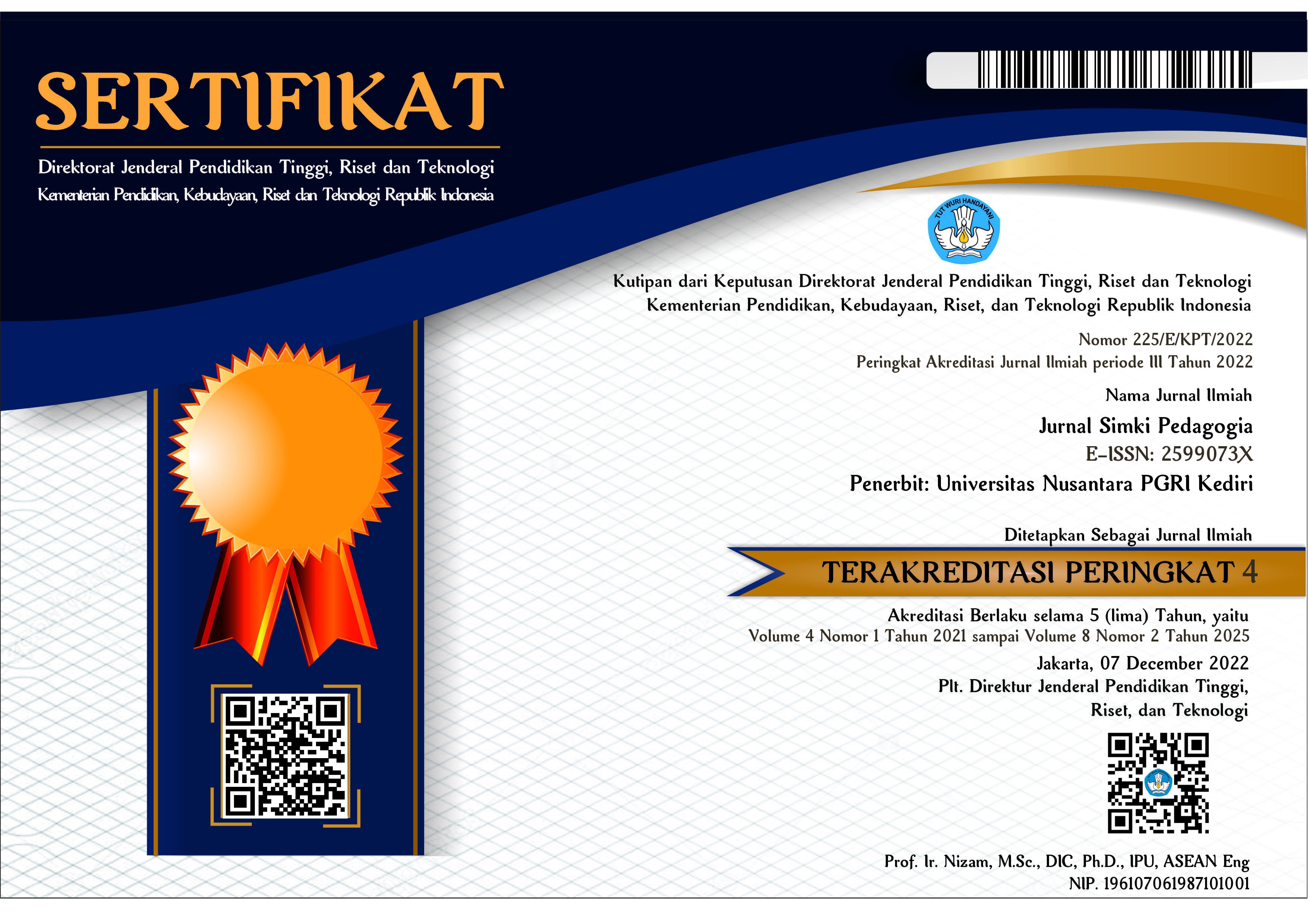Meta Analisis Efektivitas Model Pembelajaran Problem Based Learning dan Jigsaw Terhadap Kemampuan Berpikir Kritis Pada Mata Pelajaran Matematika Kelas V SD
 Abstract views: 433
,
Abstract views: 433
,
 PDF (Bahasa Indonesia) downloads: 435
PDF (Bahasa Indonesia) downloads: 435
Abstract
This study aims to determine the comparative differences in the effectiveness of the Problem Based Learning and jigsaw learning models on the critical thinking skills of elementary school students' mathematics using the meta-analysis method. The first step that must be done in this research is to determine the problem. The second step is searching for research journal data on the internet via Google Scholar. After completing the data search, the researcher obtained 20 appropriate journals. The third step is to analyze the research data to obtain strong results and conclusions, and the fourth or final step is to report the results of the research by conveying the important parts of the research results obtained. The results of the comparison of the Problem Based Learning learning model show an average increase of 24.81% then the Jigsaw learning model of 24.6%. The Ancova test using Univariate shows that the sig value is 0.00 which means it is less than 0.05 (0.00 <0.05). From the Ancova test it shows that f count > f table is -3,569 < -1,734 and the significance is 0.00 <0.05 which indicates that Ho is rejected and Ha is accepted. This shows that there is a significant difference in the use of the Problem Based Learning learning model and the Jigsaw learning model in improving critical thinking skills in mathematics subjects in elementary school students. Based on data processing, it can be concluded that the Problem Based Learning learning model is more effective than the Jigsaw learning model for elementary school students' mathematical critical thinking skills.
Downloads
References
Anugraheni, I. (2020). Analisis Kesulitan Mahasiswa dalam Menumbuhkan Berpikir Kritis Melalui Pemecahan Masalah. Jurnal Cendekia : Jurnal Pendidikan Matematika, 4(1). https://doi.org/10.31004/cendekia.v4i1.197
Asriningtyas, A. N., Kristin, F., & Anugraheni, I. (2018). PENERAPAN MODEL PEMBELAJARAN PROBLEM BASED LEARNING UNTUK MENINGKATKAN KEMAMPUAN BERPIKIR KRITIS DAN HASIL BELAJAR MATEMATIKA SISWA KELAS 4 SD. JIPMat, 3(1). https://doi.org/10.26877/jipmat.v3i1.2226
Cahyaningsih, U., & Ghufron, A. (2016). PENGARUH PENGGUNAAN MODEL PROBLEM-BASED LEARNING TERHADAP KARAKTER KREATIF DAN BERPIKIR KRITIS DALAM PEMBELAJARAN MATEMATIKA. Jurnal Pendidikan Karakter, 7(1). https://doi.org/10.21831/jpk.v0i1.10736
Damayanti, U. (2020). Pengaruh Model Pembelajaran Kooperatif Tipe Jigsaw Terhadap Hasil Belajar Matematika Siswa Kelas V Sd Negeri 2 Banarjoyo. Jurnal Pendidikan Guru Madrasah Ibtidaiyah, 1(3).
Leniati, B., & Indarini, E. (2021). Meta Analisis Komparasi Keefektifan Model Pembelajaran Kooperatif Tipe Jigsaw dan TSTS (Two Stay Two Stray) Terhadap Kemampuan Berpikir Kritis pada Pembelajaran Matematika Siswa Sekolah Dasar. Mimbar Ilmu, 26(1). https://doi.org/10.23887/mi.v26i1.33359
Phasa, K. C. (2020). Meta Analisis Pengaruh Model Pembelajaran Problem Based Learning Terhadap Kemampuan Berpikir Kritis Dalam Pembelajaran Matematika. Jurnal Cendekia : Jurnal Pendidikan Matematika, 4(2). https://doi.org/10.31004/cendekia.v4i2.296
Ruli, E., & Indarini, E. (2022). Meta analisis pengaruh model pembelajaran problem based learning terhadap kemampuan berpikir kritis dalam pembelajaran matematika di sekolah dasar. Jurnal Pendidikan Dan Konseling, 4(5).
Sariastuti, S. D., & Mawardi, M. (2021). EVALUASI KEMAMPUAN BERPIKIR KRITIS PADA PROBLEM BASED LEARNING DENGAN SETTING ONLINE. AULADUNA: Jurnal Pendidikan Dasar Islam, 8(1). https://doi.org/10.24252/auladuna.v8i1a3.2021
Sukmawati, A. (2020). Meta Analisis Model Problem Based Learning Dalam Meningkatkan Kemampuan Berpikir Kritis Pada Pembelajaran Matematika. Thinking Skills and Creativity Journal, 3(2). https://doi.org/10.23887/tscj.v3i2.30211
Copyright (c) 2023 Andri Wiyogo, Gamaliel Septian Airlanda

This work is licensed under a Creative Commons Attribution 4.0 International License.

Jurnal Simki Pedagogia : https://jiped.org/index.php/JSP/index is licensed under a Creative Commons Attribution 4.0 International License.
















